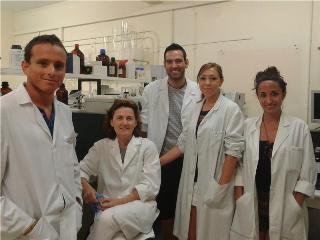Apr 15 2015
An international research project which counts with the participation of the University of Granada has demonstrated that the exposure to a chemical pollutant called PCB-153 is positively associated to the risk of suffering from cancer in males.

This agent, which has been banned in Spain since the 1980s, can still be found in some fat-rich food, such as large fat-rich fish (tuna, salmon, swordfish, among others), since it is highly resistant to degradation.
The results of this research project have been published in the Science of the Total Environment journal. The institutions which participate in the projectbelong to theBiohealth Research Institute in Granada, and they include the University of Granada, the University of Granada Hospital, the Andalusian School of Public Health, CIBER in Epidemiology and Public Health (CIBERESP), and the Granada Cancer Register. This project also includes a Danish researcher from the Bispebjerd University Hospital.
According to the PI in this research project, Juan Pedro Arrebola, from the Biohealth Research Institute (IBS), ‘there is currently an increasing tendency in the impact of a diversity of different types of cancer, which can be attributed in part to the influence of several environmental factors, such as exposure to certain chemical pollutants”
A sample of 368 men and women
The aim of this study was to analyse whether the exposure to certain chemical pollutants, accumulated over a long period of time, could be related to the risk of suffering from cancer. Scientists analysed the accumulated levels of certain pollutants in the body fat of 368 adult men and women living in the province of Granada, and they gathered information about the occurrence of cancer over a period of nine years.
“Towards the end of this period we found that among men the accumulated exposure to a pollutant called PCB-153 was positively associated to the risk of suffering from cancer. PCB-153 belongs in a group of chemical components called Polychlorinated Biphenyls (PCBs), which were profusely used in several types of industrial equipment, such as electric transformers, industrial condensers, hydraulic systems, sealing agents in construction, pesticides, and even as components in plastic materials”, according to Arrebola.
PCBs in the environment and in people
In spite of the fact that the use of PCBs was banned in Spain during the 1980s, these agents are still present in the environment and in most people, give its high resistance to degradation, and also due to the use of obsolete equipment.
“We believe that fat food is the main source of exposure to PCBs among the general population, and consequently high levels of PCBs could be, in part, the result of a fat-rich diet”, according to Arrebola. On the other hand, we suspect that PCBs could provoke cancer through several mechanisms, which include the interaction with oestrogen and androgen hormone receptors, the production of free radicals, or with DNA.
“Since cancer has a long latency period, our research group persists with their survey of this group of people to see whether these preliminary results continue after a longer period”, this University of Granada researcher concludes.